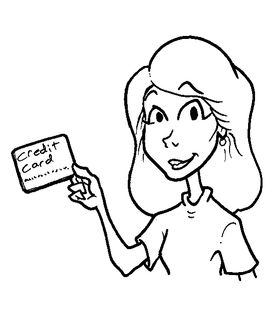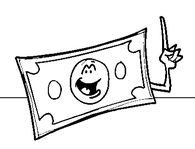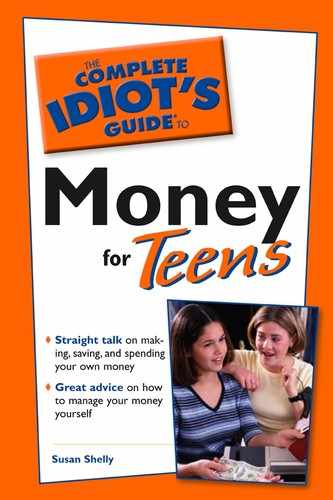
Chapter 15
Understanding Credit Cards and Debt
In This Chapter
✧ The history of credit cards and how they work
✧ Some reasons that it’s good to have a credit card
✧ Understanding the pitfalls of using credit
✧ Resisting temptation when using your card
✧ Getting a card if you want one
Credit cards are easy. Credit cards are instant gratification. Credit cards can get you what you want—when you want it. No waiting, no saving, no negotiating with Mom or Dad.
Credit cards also can be dangerous. They’ve been the cause of big trouble for millions of people who have used them improperly. Credit card debt has forced people into bankruptcy or to sell their homes to pay it off. It’s torn apart families and even caused people to kill themselves. It’s not the cards themselves that are to blame for this kind of trouble, of course, it’s the spending habits of the card owners.
In this chapter, we look at the pros and cons of credit cards and how to be smart about using them. First, let’s have a quick look at how credit cards came about and how they got to be so wildly popular.
Who Ever Thought of Credit Cards, Anyway?
It should be no surprise to hear the first credit cards were introduced by banks. As you read earlier, credit cards became popular back in the 1960s, when the Bank of America first began issuing them, and people started using them like crazy.
That’s not to say that people didn’t buy on credit before the 1960s. The practice of buying something today and paying for it tomorrow—or next week or next month—has been going on for years and years. The difference is, buying on credit used to occur directly between the buyer and the seller—there was nobody in the middle.

Imagine That
According to the National Credit Research Foundation, 55 percent of students between the ages of 16 and 22 have a major credit card.
Let’s say you wanted to buy the latest Christina Aguilera CD, but you didn’t have enough money. You’d go down to your local store—Bob’s CDs—and ask if you could get the CD and have the purchase put on your account. Bob would give you the CD, make a note under your name in his book that you owed him $16.95 plus tax, and off you’d go, earphones happily in place as you sang along with Christina. There was no need for a credit card. Bob trusted you to come up with the money and pay him when you got it. If you didn’t, you wouldn’t get any more CDs (or anything else) from Bob, and he might put a bill collector or some other unpleasant person on your tail.
Credit cards made things more complicated, and you’d have to look pretty hard these days for a store that would let you put a purchase on your account. However, people loved the idea of using a card to make purchases, and they bought everything from furniture to clothing to vacations on credit.
A big difference between the time when credit cards first became popular and now, however, is that in the 1960s almost everybody paid their cards off at the end of the month. Carrying debt was considered unwise and almost something to be ashamed of. People who got credit cards in the 60s had lived through the Great Depression—or their parents had—and they weren’t taking any chances by running up debt. Somewhere along the way, though, we lost our collective uneasiness about owing.

Scary Stuff
You can carry a balance on your credit card forever as long as you pay a minimum amount each month, but if you do, you’re heading for a big crash. You don’t win in the end by continuing to run up debt without paying it off.
It’s estimated today that about 70 percent of cardholders carry a balance from one month to another. This is called revolving consumer debt, and it’s on the rise. If you carry a balance on your credit card, it means that you don’t pay the full amount of what you owe. Let’s say you use a credit card to buy $420 worth of stuff during October. When you get your bill, you can do one of two things. You can write a check for $420 and send it back to the card issuer, or you can make a partial payment on the bill. The bank, or whatever lender issued your card, will set a minimum amount that you must pay. That minimum amount could be as little as $15 or $20.
For whatever reasons, many people don’t pay off the full balance of their credit card bill every month. They don’t have enough money, they want to use the money for something else, or they just don’t understand the dangers of running up lots of debt.
So, let’s say you decide to pay the minimum amount, and you send $20 to the bank. That leaves more money in your pocket, but there’s a catch. You still owe the bank $400, and the bank’s not gonna let you have that money for nothing. You’ll be charged interest—a lot of interest—on the money you owe. The average interest on credit card debt is around 17 or 18 percent, although there’s so much competition among credit card companies these days that it’s starting to drop off a bit.

Money Matters
If you have a credit card that’s charging you 16 to 18 percent interest, try looking around for a better rate. Check out Ram Research Card Trak at www.cardtrak.com for a list of cards and rates.
People get into real trouble when they make only the minimum payment and then go out and charge another $420 the next month. If you do that, you’ll owe $820 by the time your next bill shows up, plus the interest on the money you hadn’t paid last month. Before long, you’ll be over your head in credit card debt. However, not everybody runs into trouble with credit cards, and there are some great reasons to have one. Let’s have a look at some of the benefits of being a cardholder.
Good Reasons to Have a Credit Card
Credit cards are great—if they’re used responsibly. Many people use credit cards all the time and never run into any trouble with them—or because of them. In fact, a lot of people can’t imagine what they’d do without their credit cards.
Credit cards eliminate the need to carry around cash or a checkbook, which is both a safety consideration and a convenience. Let’s face it: It’s just not smart in most places to walk around with $200 or $300 in your pocket or wallet. Large quantities of money tend to attract attention from the wrong people, and there’s no point in taking chances. If somebody steals your cash, it’s gone. If somebody steals a credit card, you notify the card issuer and they track your account, but you’re not billed for purchases somebody else might make.
There are instances in which you really need a credit card. If you’ve ever tried to make a hotel reservation without having a credit card, you know how very difficult, or impossible, it is. The same goes for reserving a plane ticket or renting a car. They’re also great for ordering stuff from a catalog or for online shopping.
There are other good reasons to have a credit card. Used properly, it helps you to build a favorable credit history, and it’s a must-have for emergencies.
Establishing a Credit History
Someday, you’re going to want to buy a car, take out a loan for college, or even get a mortgage on a house. When these things happen, the lenders you go to will look at your credit history. Your credit history, which you start building as soon as you start charging stuff, will affect your life. It will either help you when you want to borrow money for something important, or it will hurt you. That’s why it’s really important to establish good credit as soon as you start using it.
A person’s credit history is documented in a report that’s maintained by a credit agency. There are three big credit agencies in the United States, all of which probably have the same information regarding any given person:
✧ Equifax Credit Services
✧ Trans Union Credit Information Services
✧ Experian
When you apply for your first credit card, your name and all the information you included on the application gets zapped into a computer, and your credit history begins. The agencies that maintain your credit history get information about you from banks, finance companies, credit card suppliers, department stores, and mail order or online companies—anyplace that you do business with. Your credit report also contains personal information such as your social security number, your address, your birth date, job information, and so forth.

Money Matters
Chances are you don’t yet have a credit report. If you think you do, you can check with a credit agency and get a copy of it if it exists. Find Equifax at www.equifax.com; Trans Union at www.transunion.com; and Experian at www.experian.com.
When you go to borrow money from a bank or apply for a mortgage, the loan or mortgage person can pull up your credit report and check out whether it makes sense to give you money. If your credit report shows that you pay your bills on time and have little or no outstanding debt, you stand a much better chance of getting a loan or a mortgage than if you’re six months behind on your bills and $10,000 in debt.
It used to be that you couldn’t get a major credit card without having some kind of credit history—or a parent or other adult to co-sign for the card. You’d have to establish credit with a local department store or have taken out and repaid a loan before you could get a major card. Nowadays you often don’t need to have a good credit history—or any credit history—to get a major credit card. Credit card companies are more than happy to hand out cards to practically anybody who wants them, and they’ll throw in a T-shirt or a phone calling card in the bargain.

Money Matters
The smartest way to use a credit card is to pay it off every month. In almost all cases, if you’re not going to be able to pay for it when the bill comes due, you shouldn’t be buying it.
It’s important to remember, though, that as soon as you get a card, or even apply for one, you’ve started writing your own credit history. Using a credit card responsibly will go a long way toward giving you a healthy credit rating.
Emergencies
Another great reason to have a credit card is for emergencies. Your car breaks down and you’ve got to have it fixed. You go to the next state to visit the kid you met at the beach last summer, only to find out he’s moved. It’s night, you have no place to stay, and you’ve got to get a motel room. Your bike disintegrates before your eyes, and it’s your only transportation to work. You can’t lose the job, so your only choice is to get another bike. In cases such as these, a credit card with your name on it is a very, very welcome sight.
It’s tempting sometimes to classify something as an emergency to justify a purchase, but it’s important to understand the difference. The burning desire you have for that awesome necklace you saw at the mall does not qualify as an emergency. Neither does the “need” you have for a new pair of black shoes, or the movie you and your girlfriend are just dying to see. Emergencies—real emergencies—are the best reason of all to have a credit card.
Good Reasons Not to Have a Credit Card
Credit cards can be lifesavers, but they’ve got some big disadvantages, too. If you don’t pay them off every month, you’re looking at some outrageous interest rates. Even if you do pay them off, there still might be other fees involved. Let’s have a look at some costs associated with credit cards.
Talk About High Interest!
Think about this. When you put your hard-earned money in a savings account, the bank gives you about 2 percent interest on it. Yeah, I know—real generous, isn’t it? But, when you carry a balance on a credit card, the bank sees fit to charge you 16, 17, even 18 percent interest. Does that seem fair to you? I don’t think so!
The interest on credit card debt is about the highest of any interest rate, and it can really add up quickly. If you owe $1,000 on a credit card and you make only the minimum payment each month, you’ll be eligible for senior citizen discounts before you get it paid off because of the interest that keeps on accumulating. If you’re sitting there right now thinking about the balance on your credit card and it’s getting you crazy, consider talking to somebody about it. Credit card debt doesn’t go away by itself, you know. If you have a serious problem, you might have to get advice from a financial expert. However, try talking to a parent or other adult that you know first.

Scary Stuff
You can shop around at 15 stores to make sure you’re getting the best price on a particular item. However, if you carry a balance on your credit card and are charged a high interest rate, you could easily end up paying two or three times what the item cost.
Annual Fees
If you’re paying an annual fee on your credit card, you shouldn’t be. There’s so much competition among credit card issuers these days that many are willing to waive the annual fee if you ask them to.
If you’re paying an annual fee, call the company (there should be a phone number on your monthly statement), and ask to have it waived. If they give you a hard time, tell them you’d like to cancel the card. If they still refuse to waive the fee, find yourself another card company.
Other Fees
Have you ever noticed that banks and companies that issue credit cards seem to like fine print? Check out your policy sometime, or look closely at your monthly statement. Somewhere in all that fine print, you might be surprised to read about other fees that you’re not aware of.

Money Matters
It can be really boring, but when you first get a credit card, be sure to read all the information that comes with it very carefully. Then, put it someplace where you’ll be able to find it when you need it.
Remember that there’s a lot of competition out there when it comes to credit cards, and card issuers are anxious to get your business. If weird fees start showing up on your monthly statement, get on the phone and find out why. If you’re not satisfied with the answers, look for another card.
Looking in the Face of Temptation
More dangerous for most people than any fees, however, is the temptation that credit cards can present. Feel like going out for Mexican but have no money? The restaurant takes plastic. You know those boots that are just too awesome and cost $125? You can use the credit card and pay for them later.
These days, just about every place takes credit cards. You can rent the latest movies; eat whatever you want; drink cappuccinos in every flavor; buy all the clothes, CDs, jewelry, and so forth that your heart desires; fill up your gas tank; and even contribute to your favorite charity—all without paying one penny. The only problem is all that spending catches up with you—with interest—at the end of the billing period.
What to Do If Somebody Offers You a Card
Credit cards are easy to get, that’s for sure, and high school and college students are prime targets for banks and other card issuers. You know why you’re such a hot commodity to credit card companies? The bank or company that gives you the credit card is hoping you’re gonna screw up with it and end up owing them big bucks. They’re counting on your financial inexperience.

Money Matters
A good rule of thumb is never use a credit card to buy something you won’t have anymore when the bill comes around. That means eating out, groceries, gas, renting movies, and so forth.
The National Credit Research Foundation reports that college students owe almost half of the nation’s collective $285 billion credit card debt. That’s an astounding amount of money for young people to be in debt with. It’s such a serious problem that some state legislators are considering putting restrictions on companies that target under-21s for credit cards.
If you want a credit card, you can probably get one. Credit card companies solicit by mail and hang out on college campuses and other places that young people frequent. They’re even happy to throw in a free t-shirt, telephone calling card, or restaurant coupons when you fill out and sign one of their applications.
If you’re offered a credit card, or five or ten credit cards, think carefully before you sign on the dotted line. If you’re offered a card and you want it, be sure you read the entire application carefully before you sign it. Pay especially close attention to these points:
✧ The interest rate and the amount of time for which the rate is guaranteed. Some companies give you a great rate for six months, after which time it doubles or triples.
✧ The annual fee, if any.
✧ The credit limit. (Don’t take a higher spending limit than you need—it’s too tempting to use it.)
✧ The grace period. This is the amount of time you have to pay off purchases before you start getting charged interest. It used to be 30 days, but is getting shorter and shorter.
✧ Any additional costs, such as discretionary or late fees.
✧ Miscellaneous information that might affect you.

Imagine That
Credit card companies send out nearly 2.5 billion offers for cards every year. That’s 10 offers for every man, woman, and child in America. Hard to believe, isn’t it!
If you apply for a card just to get the free stuff, make sure you cut it up and throw it away as soon as it comes to you in the mail. Resist the temptation to “test it out”—even once. If you’re offered a card that you don’t want, don’t let a company representative talk you into it. They can be pretty persuasive, so remember that you have an absolute right to say no.
Getting a Card If You Need One
If you want to get a credit card but don’t know how to go about it or you’re having trouble getting approved for one, there are several things you can do. If you haven’t yet applied for a card, you can get an application at your bank or access a bank online that offers credit cards, such as Chase or Citibank. If you’re 18 or older and have a job, you’ll probably have no trouble getting a card, but you might get a fairly low spending limit ($500 to $1,000) to start. If you keep up with your payments, though, you probably can get that credit limit increased within a year.
If you’re not 18, you’re 18 but have no credit history and no job, or you’ve already managed to establish a bad credit history, you might need to get a parent or other adult to co-sign your card. This kind of card is called a secured card, and the adult who signs it is the guarantor. In effect, the adult is guaranteeing the credit card company will get its money, because if you don’t pay it, your co-signer becomes responsible for it.

Scary Stuff
Be careful of credit card companies that guarantee unsecured cards to anyone who applies for them, regardless of age, credit history, or work history. They’re all over the Internet, and they’re—to say the least—suspect.
You’ll need to work out with your folks in advance how you’ll handle payments, and you should know that most banks require a deposit on a secured card. You or your parents probably will have to hand over an amount equal to the amount of credit you have on the card. If you have a $500 spending limit, your deposit will be $500. Secured cards aren’t ideal, but if you need a credit card and can’t get an unsecured one, at least it’s a start.
Consider carefully whether or not you need a credit card at this point. If you get one, decide from the beginning to use it responsibly. Having a credit card can be a real positive, but it can turn out to be a bummer if you don’t use the card wisely. One of the last things you want to do at this point of your life is to wreck your credit rating and set yourself up for huge hassles later on.
The Least You Need to Know
✧ Credit cards have been around since the 1960s, but are used more and more every year.
✧ Credit cards can be great to have and use, but can cause serious problems if you use them to incur more debt than you can pay off.
✧ The bank or company that issues the credit card pays the store for your purchase, and charges you high interest if you don’t pay off your credit card bill every month.
✧ Using a credit card responsibly can help you to establish a favorable credit rating, and it’s great to have a card handy for emergencies.
✧ Watch out for hidden fees and charges in addition to the regular ones.
✧ Credit cards are plentiful and you probably can get one without too much trouble if you want to.
..................Content has been hidden....................
You can't read the all page of ebook, please click here login for view all page.
